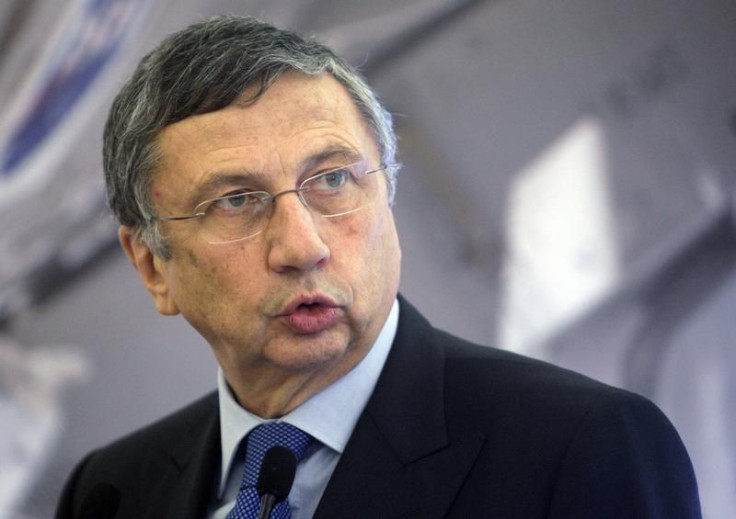‘Suicide For Our Economy’: Italian Aerospace Boss Arrested In Corruption Probe Related to Helicopter Sale To India

Giuseppe Orsi, the chief executive and chairman of Italian aerospace/defense giant Finmeccanica SpA (BIT: FNC) has been arrested on corruption charges in connection with the company’s sale of helicopters to India.
Prosecutors charge that Orsi, who has been under investigation for months, paid bribes to Indian officials to guarantee the sale of twelve helicopters to the New Delhi government when he was in charge of Finmeccanica’s helicopter unit, AgustaWestland.
In response to the arrests, the Delhi government is considering deferring the helicopter transaction.
The 560 million euro ($752 million) helicopter contract was initially awarded in 2010.
The Republicca newspaper of Italy claimed the amount of bribes paid amounted to some 51 million euros ($68 million).
Orsi has denied any wrongdoing.
In addition, three other people, including Bruno Spagnolini, the current chief of AgustaWestland, and two Swiss nationals, Guido Haschke and Carlo Gerosa, have been placed under house arrest in connection with the probe, according to reports.
Police are searching Orsi’s residence as well as the offices of both Finmeccanica and AgustaWestland in or near Milan, Reuters reported.
In a brief statement, Finmeccanica said it “expresses support for its Chairman and CEO, with the hope that clarity is established quickly, whilst reaffirming its confidence in the Judges,” adding that the company continues to operate normally.
The Prime Minister of Italy, Mario Monti, whose government is preparing for parliamentary elections in a few weeks, issued the following tepid statement on the ongoing case to the RAI television channel: "Magistrates will do their work. I'm sure they will do it thoroughly and in the best way possible. There is a problem with the governance of Finmeccanica at the moment and we will face up to it."
Monti is already dealing with the fallout from two other major cases of corporate corruption in Italy – namely, a derivative scandal at Banca Monte dei Paschi di Siena SpA (BIT: BMPS), the nation’s third biggest lender; and allegations that Saipem SpA (BIT: SPM), the oil services subsidiary of oil giant Eni SpA (BIT: ENI) paid bribes to secure contracts in Algeria.
Finmeccanica is 30-percent-owned by the Italian government. With more than 70,000 workers worldwide, Finmeccanica is Italy's second largest corporate employer, after only Fiat SpA (BIT: F).
Under Indian government laws, any foreign company involved in corruption may be subject to heavy fines, or even blacklisting. Potentially losing India as a customer could have grave consequences for companies like Finmeccanica, given that many Western European and US governments have sharply cut defense budgets.
Indeed, India is now the world’s biggest arms importer, accounting for one-tenth of all such purchases, according to the Stockholm International Peace Research Institute.
Orsi, a former air force officer and qualified pilot, was appointed the top boss as Finmeccanica in May 2011, with the backing of the Northern league party, which was an ally for then-Prime Minister Silvio Berlusconi. Orsi subsequently enacted a significant restructuring at the loss-making company.
Center-left politicians have been calling for Orsi's resignation ever since the corruption investigation commenced last year.
Monti himself reportedly did not trust Orsi – Republicca reported that according to wiretaps, a company manager was quoted as saying that the Prime Minister “would not shake” Orsi's hands.
However, one prominent Italian political figure, the redoubtable Berlusconi gave Orsi a backhanded compliment, claiming that his arrest amounted to “suicide for our economy" suggesting that "some [Italian] companies will not be able to sell anything anymore."
On the other side of the globe, India, of course, is no stranger to political corruption and the use of money of grease the wheels of big-time contracts with foreign companies is practically standard. Corruption is so endemic in India that only the worst excesses are even reported upon in the media, but sometimes their revelations spell doom for politicians.
In 1980s, a multi-million dollar scandal involving the purchase of artillery weapons from Sweden’s Bofors company eventually led to the defeat of then Prime Minister Rajiv Gandhi’s Congress Party.
© Copyright IBTimes 2024. All rights reserved.











